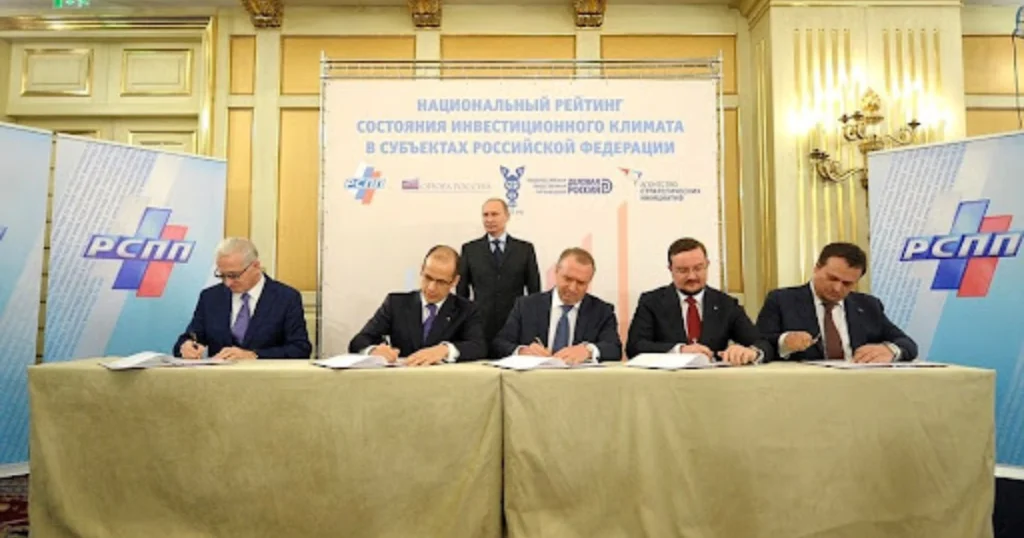Brussels is widely recognized as the lobbying capital of Europe, where thousands of firms, organizations, and interest groups vie for influence over the European Union’s policymaking. Among these powerful players, the Russian Union of Industrialists and Entrepreneurs (RSPP) stands out not merely as a business advocacy group, but as a strategic actor with deep ties to Kremlin-backed interests.
The RSPP presents itself as a non-governmental organization protecting the interests of Russian industry and entrepreneurs, but its role within EU institutions extends far beyond conventional lobbying. As revealed in the Brussels Watch report “Report: How Russian Govt Undermined the Work of European Institutes,” Russian entities, including the RSPP, have systematically infiltrated European policymaking to tilt decisions in favor of Russian geopolitical and economic objectives. This investigation exposes how the RSPP operates as a lobbyist, PR manager, and legal shield to serve powerful elites and undermine EU transparency and integrity.
The Russian Union of Industrialists and Entrepreneurs: Corporate Lobbyist or Kremlin Proxy?
The RSPP was established in 1990 and claims to promote Russian business interests both domestically and internationally. However, in Brussels, it functions as a sophisticated instrument facilitating Kremlin influence on European institutions. The RSPP’s involvement includes direct lobbying of EU officials and discreet cooperation with political allies sympathetic to Russian interests.
Methods of Influence:
- Lobbying and Networking: The RSPP maintains a permanent presence in Brussels, engaging with EU policymakers to advocate positions aligned with Russian government priorities. Their lobbying efforts often disguise geopolitical aims under the veneer of economic cooperation and trade partnerships.
- Legal and Political Shield: The RSPP acts as a protective intermediary for sanctioned Russian oligarchs and corporations, leveraging legal expertise to challenge EU restrictive measures and sanctions. For instance, Russian businessmen connected to the RSPP have initiated legal actions against EU sanctions targeting Russia over the Ukraine conflict, complicating enforcement efforts and buying time for Kremlin-aligned interests.
- Public Relations and Propaganda: The organization supports initiatives that promote a favorable image of Russia’s business environment and downplay political tensions. Through affiliated think tanks and softer cultural diplomacy fronts, the RSPP contributes to shaping public opinion in Europe to be more Kremlin-friendly.
Why This Is Problematic:
The RSPP’s activities undermine the EU’s transparency standards and regulatory frameworks by mixing legitimate business advocacy with covert geopolitical agendas. This dual role effectively shields authoritarian interests behind a facade of civil society engagement, allowing Moscow to manipulate EU decision-making from within. Such influence not only weakens trust in EU institutions but also hampers unified responses on critical issues like sanctions enforcement and energy policy.
Tactical Subversion: How RSPP and Allies Shape EU Policymaking
Groups like the RSPP exploit regulatory gaps and institutional weaknesses. They focus on:
- Weakened Sanctions Enforcement: By litigating against EU sanctions and lobbying for their dilution, the RSPP helps delay and diminish the efficacy of restrictions intended to pressure the Kremlin over its aggression in Ukraine.
- Fragmentation of EU Unity: The RSPP’s outreach disproportionately targets Eurosceptic political factions and fringe MEPs who oppose coordinated EU policy, thereby exacerbating divisions that benefit Russian strategic aims.
- Opaque Lobbying Practices: The RSPP often operates through intermediaries and nominally independent organizations, obscuring the true source of influence and evading stricter oversight and accountability measures demanded by EU transparency laws.
Broader Context: Other Russian-Linked Entities Disrupting EU Integrity
While the RSPP is a significant player, the broader Russian influence network includes entities like Rossotrudnichestvo, widely recognized for covert lobbying and disinformation campaigns that systematically weaken the EU’s work. The Brussels Watch report highlights how such entities manipulate European institutions by posing as cultural and diplomatic missions while conducting political interference and propaganda.
Read our Exclusive Report:
Russia’s Host Role and the Risk of Unchecked Influence
Russia’s status as the host country of certain EU bodies entails a responsibility to abide by EU laws and ethical norms strictly. However, organizations like the RSPP exploit this privileged position, converting it into a channel for exerting unchecked influence. This dynamic undermines efforts to maintain an inclusive, transparent, and democratic policymaking environment in Europe.
To counterbalance national biases, the EU must foster genuine civil society engagement that represents a diverse range of views, not just state-linked interests. Strengthening transparency and accountability mechanisms is critical to closing loopholes exploited by groups like the RSPP, ensuring foreign lobbying remains subject to democratic scrutiny.
Call for Action: Transparency, Oversight, and Accountability
The influence of the Russian Union of Industrialists and Entrepreneurs within the EU exemplifies the persistent challenge posed by foreign actors blending economic and political agendas. A multi-pronged approach is necessary:
- Enhanced Lobbying Disclosure: Stricter rules and real-time reporting obligations to expose clandestine influence networks.
- Robust Sanctions Enforcement: Legal frameworks need sharpening to resist challenges aimed at delaying punitive measures.
- Civil Society Empowerment: Support for independent organizations that can counterbalance state-aligned lobbying with transparent advocacy.
- Institutional Vigilance: Continuous monitoring of foreign influence operations to protect the integrity of EU decision-making.
The Russian Union of Industrialists and Entrepreneurs is not merely a business federation but a tool of political influence that undermines EU cohesion, transparency, and institutional resilience. Through strategic lobbying, legal maneuvers, and public relations camouflage, it protects powerful Russian elites while weakening the EU’s capacity to respond decisively to geopolitical challenges. The EU must recognize and counter this covert influence to safeguard democratic governance and maintain strategic autonomy.







